Key takeaways:
- The death penalty has profound emotional impacts on families, leading to feelings of shame, isolation, and mental health struggles.
- Community support is crucial for families coping with the death penalty, fostering connection and providing practical assistance during difficult times.
- Advocacy against the death penalty emerges from personal experiences, highlighting the need for rehabilitation and the emotional toll on families affected by wrongful convictions.
- Healing for families often involves shifting perspectives from vengeance to advocacy, transforming grief into a powerful force for change.
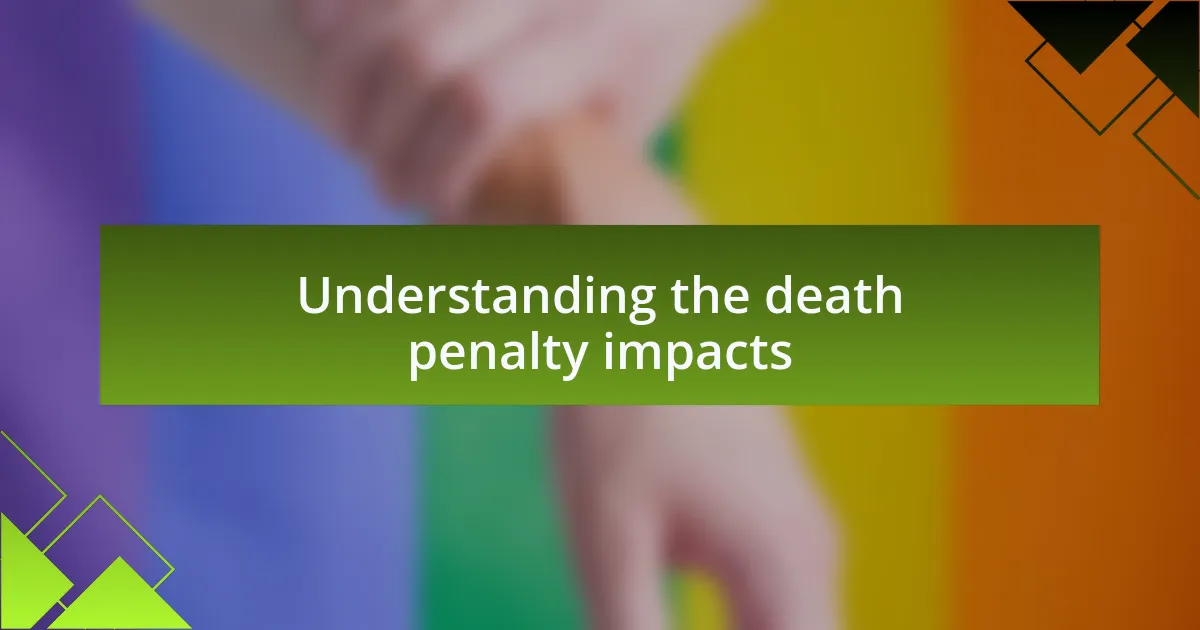
Understanding the death penalty impacts
The death penalty profoundly affects not just the individual facing execution, but also their families, who often endure a complex web of emotions. I remember speaking with a woman whose brother was on death row; she described the suffocating pain of waiting for news, the isolation from friends who couldn’t comprehend her situation. How does one find closure when the legal system’s finality looms?
Families of those who commit capital crimes often grapple with shame and stigma that can permeate their entire community. In my experience, I’ve heard stories of families torn apart, where guilt and anger cloud relationships for years. What happens to these lives shaped by such tragedy? The ripple effects are profound, as they mold new generations who carry the burden of their relatives’ actions.
Moreover, the emotional toll can lead to chronic stress and mental health issues among family members left behind. It’s heartbreaking to consider how the decision to impose the death penalty impacts not just one life, but intertwines with many others, forming a cycle of suffering. Have we ever stopped to think about the unseen victims in this narrative? The consequences stretch far beyond the courtroom, revealing a tragic reality that deserves our compassion and understanding.
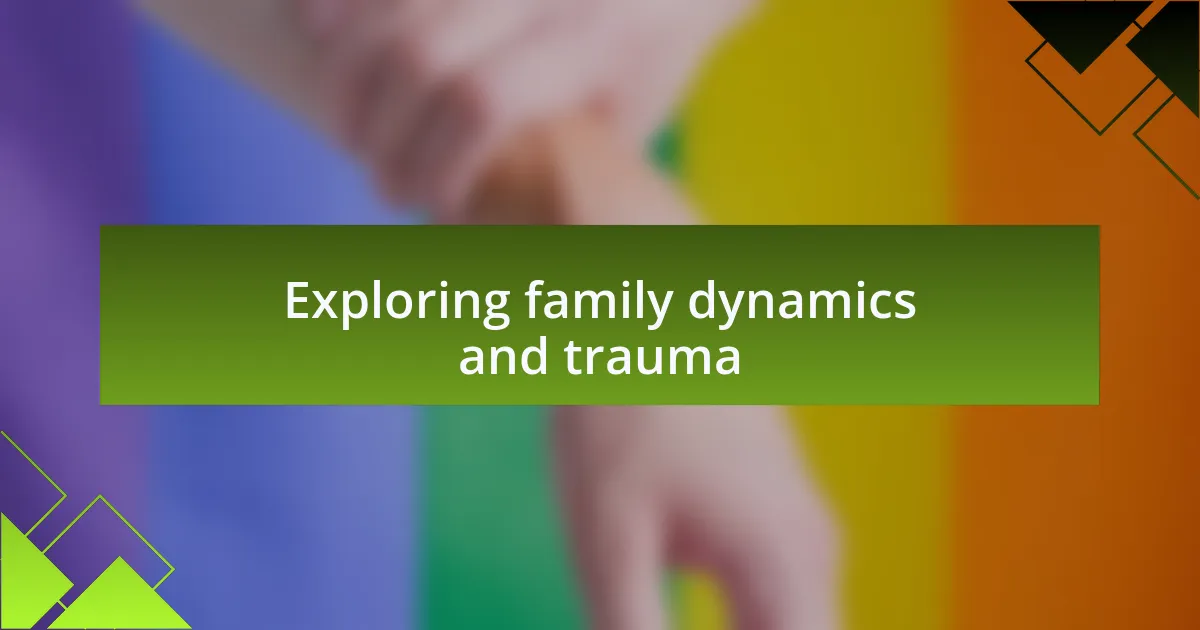
Exploring family dynamics and trauma
The dynamics within families affected by the death penalty can shift dramatically, adding layers of complexity to their relationships. I once listened to a father lamenting how he had to distance himself from his son on death row, fearing the backlash from friends and community. It raises an unsettling question: can love truly endure under such intense scrutiny and shame?
When faced with the reality of the death penalty, many families are thrust into a chaotic emotional landscape marked by fear, anger, and confusion. I recall a conversation with a mother who felt she was grieving not just her son, but also the hopes she once had for their future together. How do you reconcile a love so deep with the actions that led to such despair?
The trauma doesn’t just disappear; it manifests in ongoing struggles with mental health, often leaving some family members feeling isolated in their grief. I’ve seen siblings bearing the weight of their family’s history, burdened by a constant worry about how society views them. Isn’t it tragic that innocence can be overshadowed by another’s actions, forever altering the family landscape?
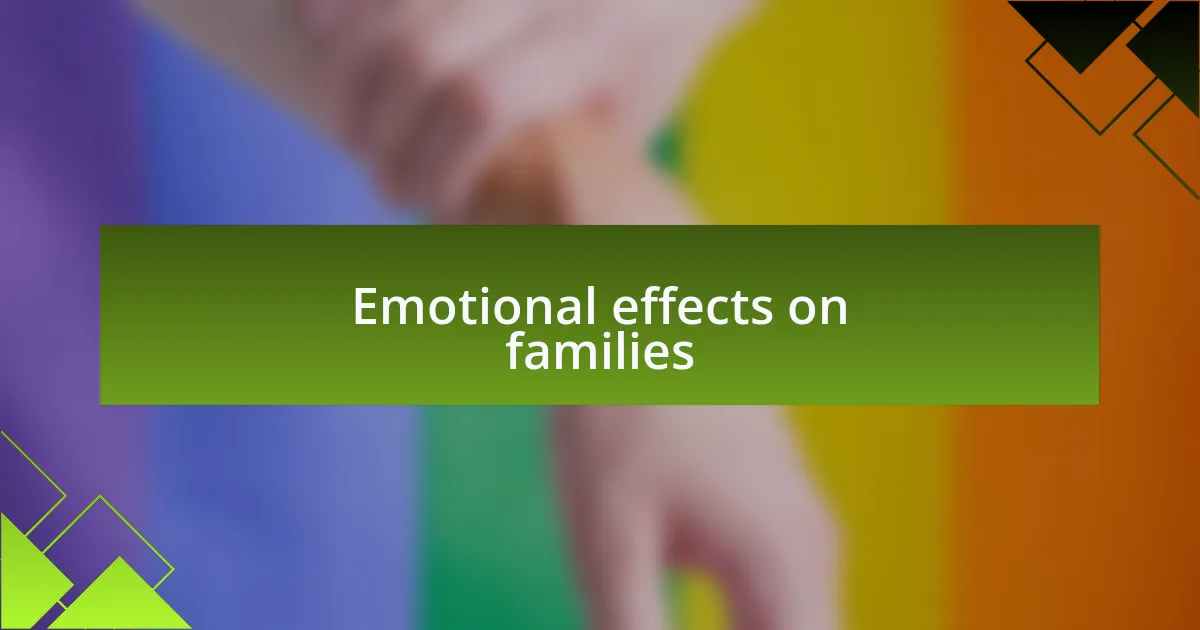
Emotional effects on families
The emotional toll on families confronting the death penalty is profound and often indescribable. I remember speaking with a sister who was haunted by the constant judgment from others; she often felt like a pariah, grappling with her brother’s fate. How do you navigate a world that views your loved one through a lens of condemnation rather than understanding?
It’s fascinating yet heartbreaking how the fear of losing a family member permanently transforms the way relatives interact with one another. I met a woman who shared that family gatherings became unbearable; the absence of her brother left an unsettling void that no one knew how to address. Isn’t it remarkable how silence can echo louder than words in moments of shared grief?
Moreover, the emotional scars of those left behind can linger for years, intertwining grief with resentment. I recall a conversation with a father who felt torn between his love for his son and his desire to protect his family’s reputation. The question remains: how can one heal when love and shame are inextricably linked?
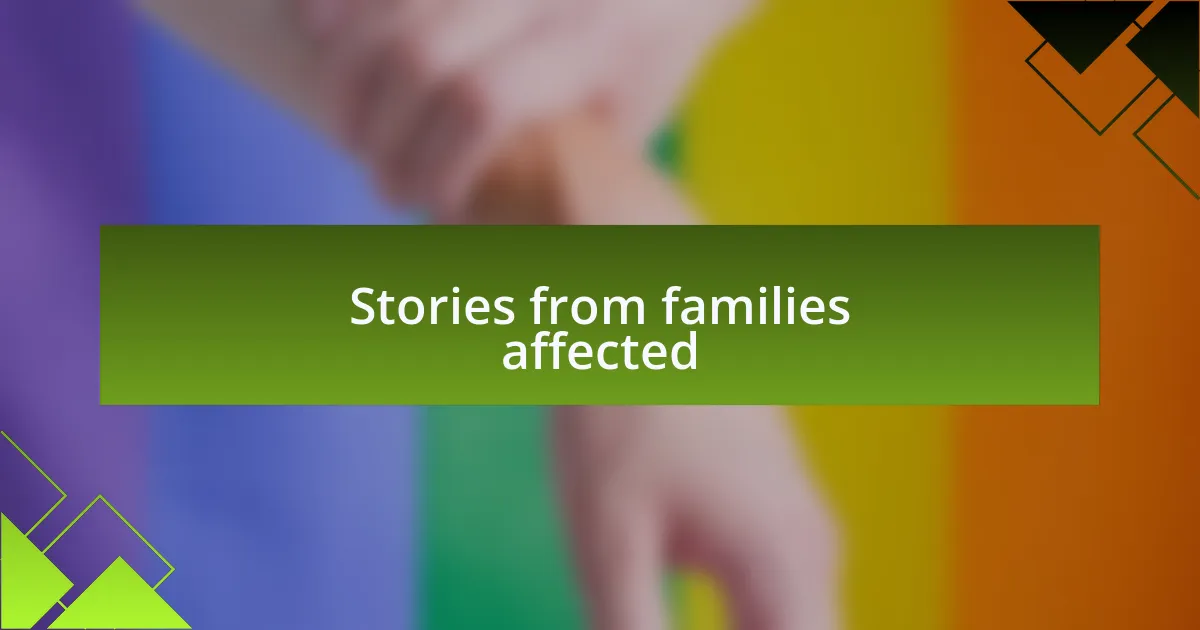
Stories from families affected
Stories from families affected by the death penalty reveal deeply personal struggles often shrouded in silence. I met a mother who lost her son to execution; she shared how she now visits the same place they used to celebrate his achievements but feels a crushing heaviness instead. How do you fill the echoes of laughter with memories of loss?
Another poignant story came from a brother who felt the overwhelming pressure to keep his family together after the state took his sibling’s life. He recounted how his own identity became intertwined with that grief, pushing him into isolation. Isn’t it heartbreaking how one tragedy can fracture not just individual lives but the very fabric of a family?
Then there’s the perspective of a widow who found herself grappling with the complexities of societal judgments after losing her partner to capital punishment. She often pondered whether the love they shared was tainted by fear and stigma. How do we redefine love amidst such overwhelming sorrow and scrutiny?
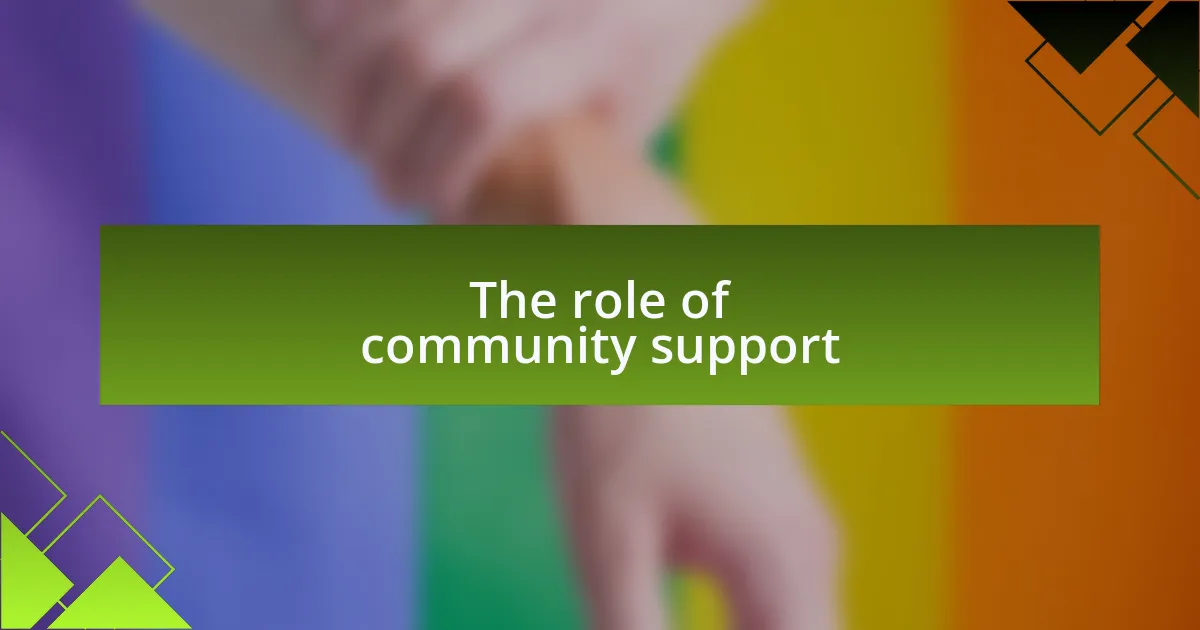
The role of community support
Community support plays a vital role in helping families navigate the aftermath of the death penalty. I once spoke with a woman who had lost her brother and found solace in a local support group where she connected with others who shared similar experiences. The sense of belonging they created was a lifeline, transforming shared sorrow into a powerful bond of resilience. How crucial is it to have that communal understanding during such dark times?
I vividly recall hearing from a family that organized weekly gatherings in their neighborhood to honor their loved one who was executed. These gatherings weren’t just about remembering; they were about creating a space where grief could be expressed openly. Each candle lit was a reminder that their loved one’s life, though lost, sparked discussions on justice and empathy. Isn’t it inspiring how the community can turn a personal tragedy into an advocate for change?
Moreover, community support can also offer practical assistance. One family I encountered found themselves overwhelmed by legal fees and media scrutiny. Their community rallied, providing funds and resources to help them cope. This collective action not only eased their financial burden but also reminded them that they weren’t alone in their fight. Doesn’t it make a significant difference when people come together to lift each other up during life’s most challenging moments?
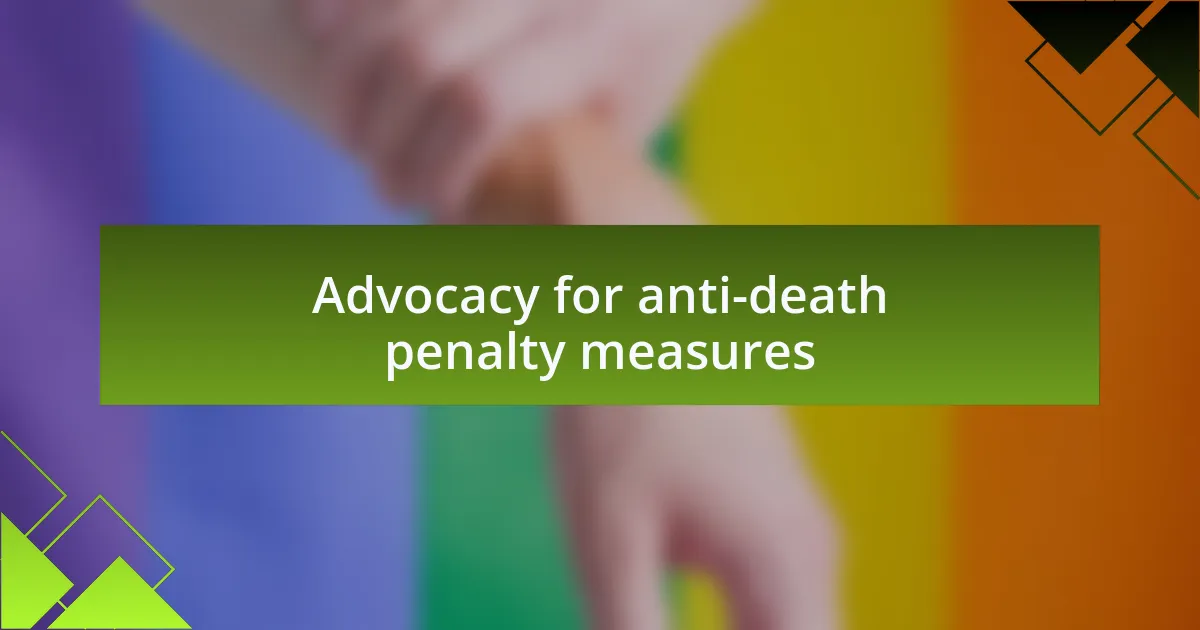
Advocacy for anti-death penalty measures
Advocacy for anti-death penalty measures emerges from a deep-seated belief in the potential for rehabilitation and the sanctity of human life. I remember attending a rally where a father spoke passionately about his son’s wrongful conviction. His heartfelt plea resonated with many; it underscored that the death penalty not only affects the accused but also devastates families who are left to grapple with a system that seems unforgiving. How can we ignore the human stories behind the statistics?
In my own journey of understanding, I participated in discussions with individuals who support the abolition of the death penalty. One woman’s story particularly struck me; she described how her brother, once on death row, was exonerated after years of relentless advocacy. She spoke of the emotional toll not just on him, but on the family as a whole—the stress, the anxiety, and the sheer fear of loss. Isn’t it a tragic reality that such stories exist, reminding us of the fragility of justice?
Engaging in public forums and storytelling allows families affected by the death penalty to share their experiences. I once witnessed a panel where survivors of victims shared their insights on forgiveness and their rejection of an eye-for-an-eye mentality. Their narratives often sparked intense dialogue and empathy among attendees. Could the path to impactful change lie in listening to these personal testimonies and understanding the profound effects of capital punishment?
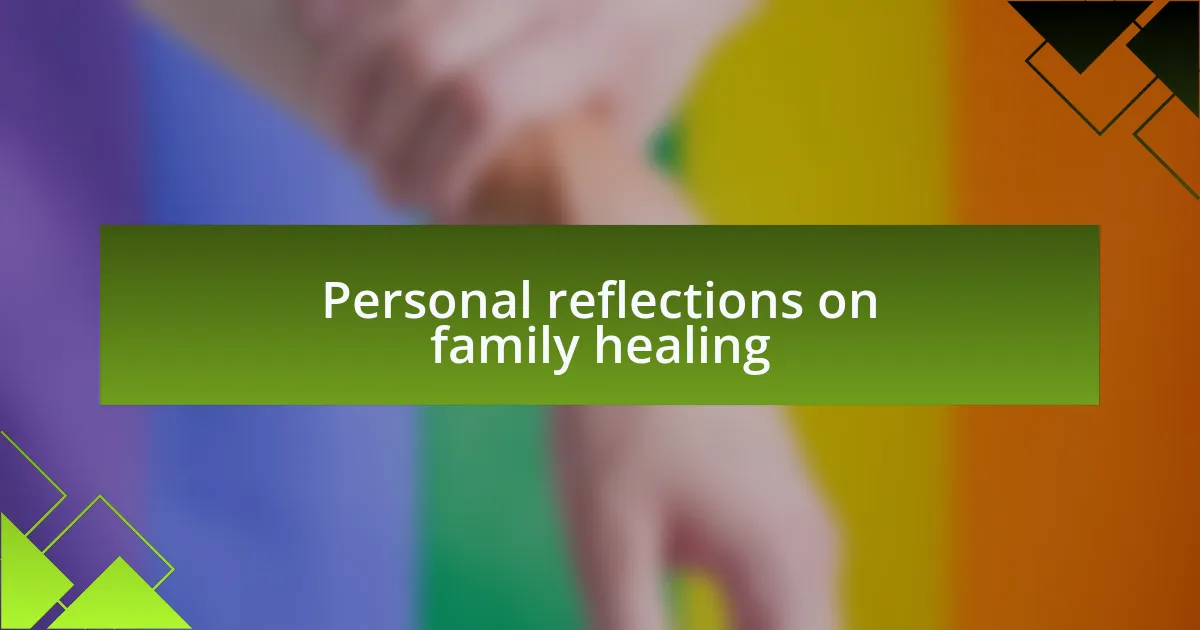
Personal reflections on family healing
The journey of healing for families impacted by the death penalty is often complex and layered. I recall a close friend whose sister was a victim of a violent crime, and their family had to navigate not just the loss but also the implications of seeking justice through the death penalty. They often spoke about how the focus on punishment overshadowed their grief, leaving them to question whether true healing could ever come from vengeance.
In conversations with those affected, I have learned that healing often requires a shift in perspective. One mother shared how, after her son’s wrongful conviction, she found solace in supporting anti-death penalty initiatives. This commitment not only honored her child’s memory but also transformed her pain into a powerful force for change; it pushed her family to focus on advocacy rather than the cycle of suffering. How empowering it must be to channel grief into creating a more compassionate world.
I also learned that healing isn’t a linear process but often involves revisiting painful memories. A woman I met at a support group described how she struggled with anger toward the system, but through storytelling and community support, she found a path to forgiveness. Was it easy? Absolutely not. Yet, she emphasized that sharing her journey helped her family mend while creating a space for others to join in their healing. Isn’t that a testament to the transformative power of community?